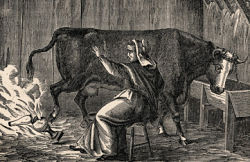144 - Miracle Worker: al-Ghazālī against the Philosophers
In his Incoherence of the Philosophers, al-Ghazālī attacks Avicenna’s theories about the eternity of the universe and insists on the possibility of miracles.
Themes:
• Al-Ghazālī, The Incoherence of the Philosophers, translated by M.E. Marmura (Provo: 1997).
• B. Abrahamov, “Al-Ghazālī’s Theory of Causality,” Studia Islamica 67 (1988), pp. 75-98.
• I. Alon, “Al-Ghazālī on Causality,” American Oriental Society Journal 100 (1980), pp. 397-405
• L.E. Goodman, “Did al-Ghazālī Deny Causality?,” Studia Islamica 47 (1978), pp. 83-120.
• F. Griffel, “Taqlīd of the Philosophers: al-Ghazālī’s Initial Accusation in the Tahāfut,” in Ideas, Images, and Methods of Portrayal, ed. S. Günther (Leiden: 2005).
• B.S. Kogan, “The Philosophers al-Ghazālī and Averroes on Necessary Connection and the Problem of the Miraculous,” in P. Morewedge (ed.), Islamic Philosophy and Mysticism (Delmar: 1981), 113-32.
• T. Kukkonen, “Possible Worlds in the Tahāfut al-Falāsifa: al-Ghazālī on Creation and Contingency,” Journal of the History of Philosophy 38 (2000), 479-502.
• M.E. Marmura, “Ghazali and Ash‘arism revisited,” Arabic Sciences and Philosophy 12 (2002), 91-110.
• S. Riker, “Al-Ghazālī on Necessary Causality,” The Monist 79 (1996), pp. 315-324.







Comments
Al Ghazali's Tahafut
Given Al Ghazali's views on empiricism (Second Preface) and causality (Problem 17), and critique of the logic of the philosophers, could we see him as a proto-logical positivist?
In reply to Al Ghazali's Tahafut by Scott Mataga
Ghazali the positivist
Well, the more usual comparison is with Hume, but only on his discussion of causation. Unlike Hume and the logical positivists he was not an empiricist nor did he think natural science exhausts what we know; to the contrary he even thought there was a superior kind of knowledge, as discussed in his autobiography (I discuss this in episode 143).
Caused eternal universe?
Hello professor.
If avicenna maintains that the world is caused in spite of it being eternal, in what sense this causation by God occurs?
If God is ontologically (and not temporally) posterior to the world, similar to a body's being ontologically posterior to its shadow, then, since we need light for the shadow to be cast, would not we, in accordance with the analogy, need another cause for God to cause the universe?
Also, to be an considered a creator is to create ex nihilo, from non being to being, etc. If the universe was always existing, would not it presuppose that God is not its creator?
Regards, and thank you.
In reply to Caused eternal universe? by Ajmal
Creation
Your reaction is pretty much the same as Ghazali's, at least the second point you raise. Obviously if you just assume that "creation" means "bringing something to be after it has not been" then Avicenna's God is not a creator. But I tend to think Avicenna is right: why think that God can only create if there was a period of non-being beforehand? Ask yourself: what exactly is it that stops an omnipotent God creating an eternal universe, should He desire to do so?
As for your first point obviously there is a potential regress looming there. It doesn't seem to me right to say that every cause needs another cause; there could be an uncaused cause, which is exactly what Avicenna thinks God is. (I agree that the light-shadow analogy doesn't capture this, but I think it is not Avicenna's analogy anyway!)
In reply to Creation by Peter Adamson
Creation
Hello, and thank you for follow up.
For avicenna, God must create if there was a period of non-being beforehand, because if there was a period of being beforehand, either that being must be a necessary existent, which is absurd according to avicenna himself (he proved that there is only one Necessary Existent - God), or it is a self caused cause, which, again, according to avicenna, is absurd (except in the case of God, since God is the ONLY Necessary Existent).
Your question about the impediment stopping an Omnipotent God is self refuting because to consider God as an Omnipotent vindicates God's ability not to be stopped or impeded by ANYTHING. Therefore, there is nothing that CAN stop God from creating an eternal universe. That is, God can still create the universe eternally, but at the moment that that creation occured, that is from whence time initiated. I believe ghazali would say something along with those lines.
Now, if time is created, that is to say the measure of (material) motion is created along with the creation of the universe, there must be duration before this creation of the universe. I believe the contemporary philosophy calls it B-Series time.
Also, for ghazali, it is the will, not resolve, that is the cause of the world's creation ex nihilo by God.
Also, the statement 'not every cause needs another cause', according to avicenna, is correct only in the case of the Necessary Existent - God, but, again, according to avicenna himself, there is only ONE such cause, and ALL the other causes, in so far as they are causes, must have causes and the Ultimate and Only cause of them would be the Necessary Existent, God.
Is Falsafa Philosophy or Avicennism?
Jurists belonged to schools that traced their origins to the work of key founders, while jurists they departed radically from the views of those founders they provided necessary legitimacy and legal writers sought to display their opinions as in conformity of the general spirit of the founders. One argument which jurists often use against each other in inter-school debates is that the opponent's opinion departs substantially from that of the founders. Might this explain the confusion over Al-Ghazzali? By Falasifah, Al-Ghazzali may not have been attacking an academic field of study, but a school or group of people in a simmilar way in which he attacked Ismailism. Given the broader way in which we use the term Philosophy Al-Ghazzali may not have opposed it, instead he appears to be attacking a specific group of people whoose doctrines, some good some unacceptable, have become very popular to warrent a whole book devoted to them. Might it also explain why Averroes often complained that such and such view held by such and such person was not in conformity with some axiomatic principle laid out by Aristotle? In some ways a very juristic approach to philosophy.
In reply to Is Falsafa Philosophy or Avicennism? by A.
Falsafa
Yes, good point. In general it is potentially misleading to translate falsafa as "philosophy" because really the Arabic word refers to something very specific, having to do with Greek-influenced thought and later on it means Avicennism. So for instance I would say that some figures are "philosophers" though they explicitly refuse to identify themselves as falāsifa (Ghazali is an example).
I find the discussion of the
I find the discussion of the eternity of the world interesting because both Avicenna and al-Ghazali seem to be assuming al-Razi's (al-Razi as in "the heretic". By my count, we've run into 3 al-Razi's in this podcast already ;)) view of absolute time. To ask why God would create the world at one time rather than another assumes that it's coherent to talk about "times" when the world didn't exist. But it's not at all clear to me that the concept is coherent, and some of the Christian Greek fathers explicitly denied it (Basil of Caesarea for example argued that the beginning of creation is the beginning of time itself, and "The beginning of time is not yet time, . . . not even the least part of it." I would argue on a sort of Humean line that we can't even conceive of what time might be without smuggling in some notion of a changing thing (even if it's just imagining some consciousness counting the seconds as they pass, and thereby changing in terms of mental content). Of course, when al-Razi describes absolute time by saying "tick tock", he's imagining a clock counting off the seconds. I think one of Avicenna's arguments about God could be adapted here too. If we imagine two moments of time before the creation of the universe, what makes them "two" moments of time? The only answer I can think of would be the temporal relation between the two itself, but what is this relation? In what respect is moment 2 different from how it would otherwise be on account of being after moment 1 (or vice versa)? It seems more coherent to me to just reject the idea of absolute time and stick with relative time as the only time there is. If this is so, the problem Avicenna raises disappears. To say that the world is not eternal doesn't mean that God chose moment 10 billion to create the world (rather than moment 5 or 700), but rather that God eternally creates the world in such a way as it is limited in time and has an absolutely first moment.
On the other question of whether it makes sense to speak of God creating an eternal universe, I think Avicenna has the better of the argument (at least in terms of God's creating. I'm not sure the idea of an infinite temporal past is coherent itself, but assuming it is). I don't remember the source of the thought experiment, but I remember hearing the example of a sandal that eternally sits on top of some sand. The imprint in the sand would be eternal (since both the sandal and the sand are eternally there) but it seems unproblematic to state that the sandal causes (creates) the imprint. I think a similar point could be made using mathematical concepts. I think it makes sense to speak of the truth of more elementary mathematical facts "causing" the truth of other mathematical facts that they entail. The fact that math is eternal in the strongest sense (not just existing at all times, but being outside time altogether) doesn't change the dependence of some mathematical truths on others.
There was one other issue that occurred to me, that relates more to Asharism in general than al-Ghazali in particular. If it's the case that God's goodness is just an "analytic" truth (God is good simply in the trivial sense that anything God does becomes good by God's having done it), I don't see how you can avoid the conclusion that God might essentially be Descartes' evil demon. If God's actions don't conform to any substantive standard of goodness, what grounds do we have to think that God doesn't, for example, delude al-Ghazali with false experiences of "light"? A related question occurred to me in the episode about the Asharites, specifically when they say that God could punish believers and reward unbelievers, and that this action would be good. The Asharites seem to discuss this as an abstract possibility, but I don't see what grounds they have for asserting that it isn't really the case. The only reason to think that would be if you assumed that God wouldn't lie, but their own view doesn't seem to give them any reason to believe that this is actually the case. I'm having trouble seeing how that Asharite view doesn't lead right back to a strong Pyrrhonist position. We could reason things out with our minds, but maybe God enjoys creating us as idiots and laughing at us when we get everything wrong. Then if we try to rely on revelation (either prophetic or mystical) to help us further, we could just be falling for another of God's tricks. If all this is true, then it seems we might as well go in for some kind of Epicureanism or Cyrenaicism, since it at least seems like these ways of life are more pleasant than others, and we have no reason to believe that God will reward devout believers rather than, say, good wine connoisseurs.
As an aside, I'm really enjoying the "Islamic World" series of podcasts. I studied philosophy at school, but Islamic thinkers tended to be neglected in the curriculum except insofar as they were useful background for Latin Medieval philosophy. Thanks a lot for these episodes!
In reply to I find the discussion of the by Ryan W
Timelessness etc
First of all thanks, I am glad you are enjoying this series within the podcast!
Secondly, I agree with you about timelessness, and in fact you don't need to go to Hume to defend that idea because Aristotle also makes time depend on motion or at least potential motion. So within Aristotelianism you could have a good argument that with no cosmos, there would be no time. In fact Ghazali himself, in the Incoherence, asserts that there is no time before creation. When he argues that God could arbitrarily choose a moment for the cosmos to begin he is, I believe, just granting for the sake of argument that time is passing prior to the creation of the universe, but in fact he thinks that this premise is untrue anyway. By the way he has an example like the footprint/sandal case (which if I remember rightly is from Avicenna), namely a finger ceaselessly stirring water: even if the stirring never began, the finger and not the water is clearly the cause. Again I agree with you that Avicenna is right about this: causal priority doesn't require temporal priority.
Finally as to whether Asharism yields moral skepticism, of course their opponents said so! They however would, I think, firstly say that if God were deceiving us systematically, then He is well within His rights to do so. He can do whatever He wants and He's not subject to our moral judgment. However they would also say that the Quran, as the word of God, is trustworthy as a report of what God intends and has decided; so they would rule out the possibliity that the Quran itself is just one big lie. I don't think this is inconsistent: what they are recommending is total obedience to God both in terms of His moral commands and in terms of believing what He says. To worry that the Quran is a deception would be a failure to follow that policy, not a consequence of it.
Add new comment